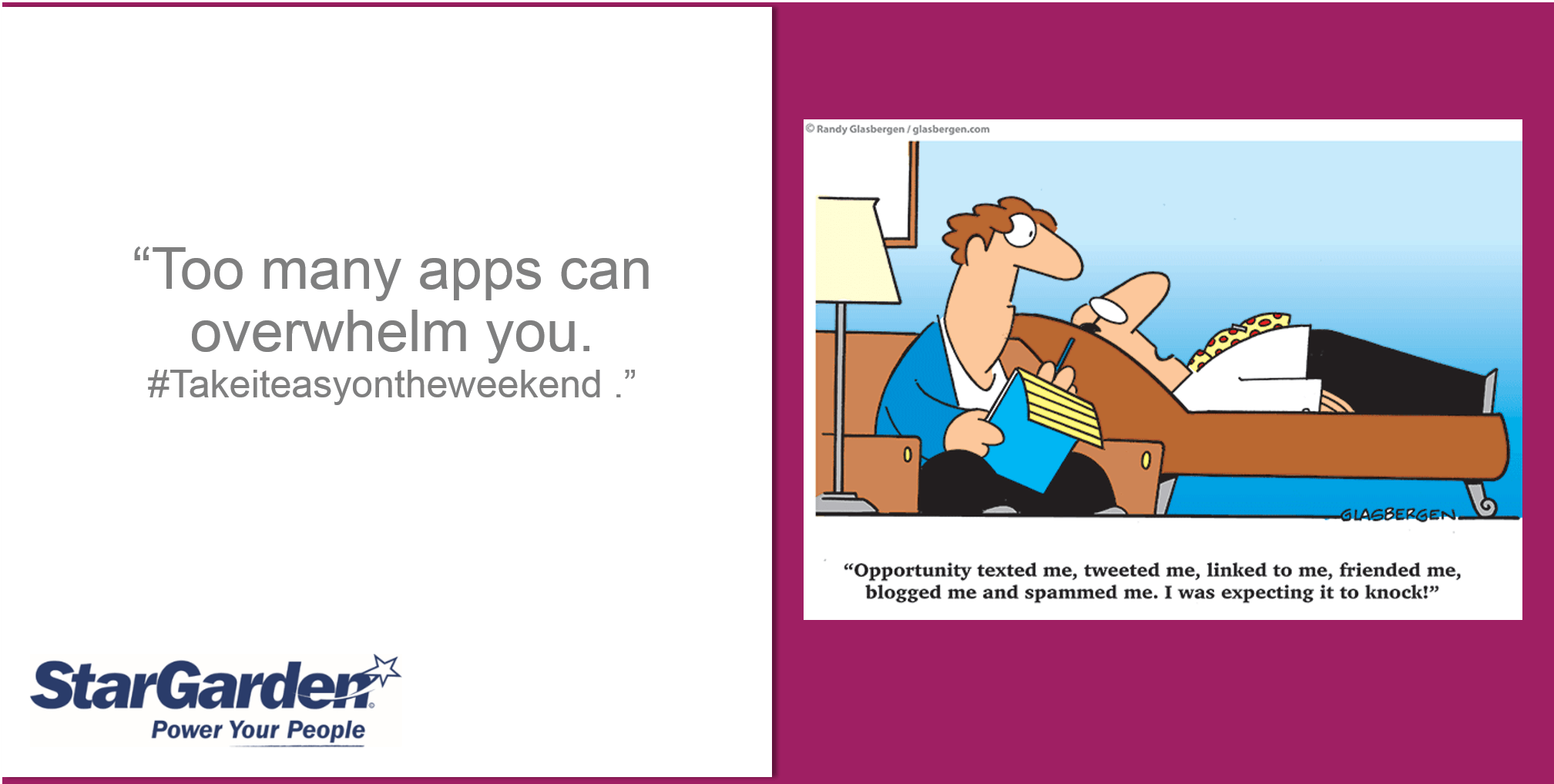Where have our weekends gone?

Remote access, email, cell phones and other modern technological conveniences can enhance the workplace. They can enable employees to have a great deal of freedom and flexibility, allowing them to work flexible schedules from the locations of their choosing. But we’ve seen repeatedly that constant connectivity can have a dark side, and lead to unintended consequences. One of these is “information overload,” which may actually decrease productivity.
Are we overwhelming our employees?
Employees who are stressed out, exhausted, or overwhelmed are business and productivity problems. The digital world of work means using a combination of social, mobile, and cloud-based mediums of working together with people. Its constant accessibility has also given rise to the phenomena of employees being available 24 hours a day, seven days a week. People now check their phones an average of 150 times a day!
Frequently, the globalization of teams means that some team members are working at every part of the day. Coordinating these teams means sending and responding to emails, telephone calls, and conferences at all hours of the day and night. Whether as a result of globalization or just modern expectations, many employees have little opportunity to get away from their devices and completely unplug.
More activity isn’t leading to more productivity
With so much constant activity, one would expect a commensurate increase in productivity. But in fact the reverse is true: With the increase in information, people spend more time on their devices looking for information rather than using it to drive value out it. This inefficient use of connectivity does not dramatically improve worker productivity, but does result in workers feeling burned out and overwhelmed. Only 13% of employees report feeling “highly engaged” with their work.
Companies have overwhelmingly embraced employees’ willingness to remain constantly connected, but are not helping them adapt efficiently and effectively. 57% of respondents to Deloitte’s 2014 global Human Capital Trends survey believe that their organizations are not doing a good job helping workers address information overload and today’s demanding work environment.[1] They ranked their organizations are “weak” when it comes to helping leaders manage difficult schedules and helping employees manage information flow, and said that their organization is doing a poor job of helping workers address information overload.

Fundamental management and leadership solutions
Technology has been known to cause or contribute to the overwhelmed employee phenomena and the information overload of a company’s workforce. Many times, employees are so busy because they do not delegate tasks like they did before the connected era.
For example, rather than enlist a co-worker’s help to finish a project before leaving for vacation, a manager may now decide he can finish it on the plane and send it to a client via e-mail when he arrives at his destination. In addition to eating into the beginning of his time off, the follow-up communication that will likely occur ensures that he never fully disengages through the course of his “vacation.”
Changing your perspective on technology can help you manage the erosion of work-life balance and help alleviate constant information overload. Here are 5 tips that can help to alleviate some of the overwhelmed employee phenomena:
- Offer time management courses to help employees prioritize tasks.
These often include advising employees to set aside blocks of time for emails rather than constantly dropping what they are doing and responding.
- Consider restructuring large global teams to respond faster and perform better (and take pressure off their members to constantly respond to communications at all hours).
Research shows that smaller, quicker, more agile teams are more effective and efficient.[2]
- Help employees learn to say no on tasks -- and make it ok to say so or delegate to others.
Enforcing a company culture that values separation and time away from work is vital to encourage employees to actually implement these recommendations.
- Improve your information access systems.
Systems that are easy to use, allow one click or swipe to get to the information, and define processes with fewer steps improve efficiency.
- Changing expectations by example, including email-free times, no-work lunch breaks, and actual vacations.
Senior leadership should set an example, following and modeling the policies for all employees.
Implementing good leadership strategies that consider the “big picture” in these ways allow employees to disengage and recharge. This improves employee engagement and productivity while reducing burnout. Take back the weekend now!
References:
[1] http://dupress.com/wp-content/uploads/2014/04/GlobalHumanCapitalTrends_2014.pdf
StarGarden’s workflow automation solutions are the answer to helping your business run more efficiently while promoting a balanced company culture. StarGarden’s HCM suite is customizable, mobile-friendly, and complimentary to your existing HR & payroll solutions. See more at www.stargarden.com or contact us for a free demo of our newest integrated software solution, StarGarden 5.0.

